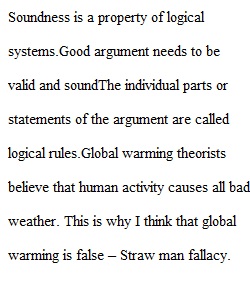


Q 1. When an argument's conclusion follows necessarily from the premises, we call it 2. What is soundness?3. What are the two characteristics of a good argument?4. What do you call the individual parts or statements of an argument?5. Is the following argument a straw man fallacy or an ad hominem attack?6. Is the following a slippery slope fallacy or a generalization?7. Is the following a false analogy, a false dilemma, a slippery slope, or a red herring?8. What do we call invalid patterns of inference?9. Explain the "tu quoque" fallacy.10. What do we call the argumentative structure that contains premises with common terms and a conclusion?
View Related Questions